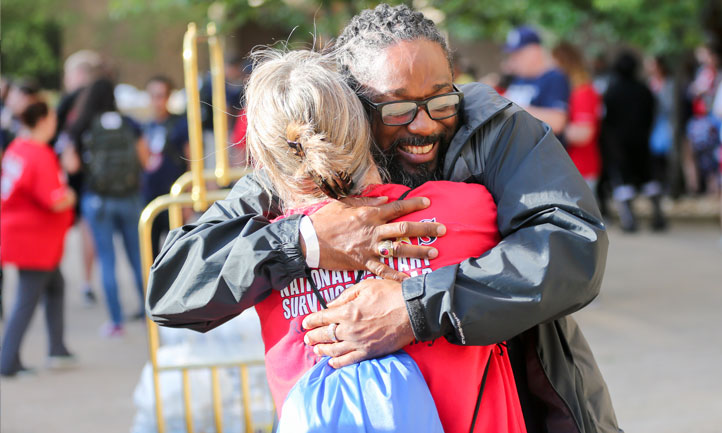It Takes A Tribe
Author: Shauna Springer
When we lose someone we love, it’s easy to lose hope. We can become helpless and only see the darkest parts of grief. But there is hope. There is help. There is healing.

It takes a tribe - a group of people who share a common language, culture and history - to preserve life after loss. Those who have lived through similar experiences provide a guiding light and a rallying unit. Professional mental health providers play an important role, but peers and loved ones have a number of compelling advantages over mental health professionals when it comes to saving lives.
The power of touch
Touch has the power to drive an awareness of connection into a person’s psyche more deeply than verbal exchanges.
The touch of someone trusted and safe can help ground us. Research has shown that a hug releases oxytocin (a bonding hormone), lowers blood pressure and decreases cortisol (a stress-related hormone). In the context of a healthy marriage, the act of holding one’s partner calms inner chaos and restores a sense of connection and safety.
At TAPS, hugs are used to communicate attachment, safety and commitment to the healing of those who are grieving life-shattering losses.
A trusted peer mentor or a loved one can sit with someone who is suffering, lean into them or put an arm around them. A peer mentor can also offer a prolonged embrace. Deep, safe, positive connection with others has the power to conquer negative, hopeless thinking. A loved one or peer can say nothing and yet communicate a profound sense of connection just with the power of touch.
The power of expressing attachment needs directly
Clinicians may feel a form of love within the context of a strong therapeutic alliance. But it would be very odd (and probably unethical) for a therapist to say to a patient, “I love you and I need you, so let’s figure out how to walk through this valley together on the basis of the love and trust we share.” However, this is precisely what a loved one is empowered to say.
A TAPS Peer Mentor might say, “You are a member of the TAPS family now.” To some who are in crisis, these can be life-saving words. While clinicians are generally trained to maintain a clinical distance, peers and loved ones can directly express attachment needs at a possible critical point in time for someone who is suffering with suicidal ideation.
The power of old stories
In my suicide prevention work, I often refer to the suicidal crisis mode as entering “a tunnel of despair and disconnection,” where the walls progressively close in. As this happens, patients report that it is hard to access information and memories stored in other parts of their brain, especially positive memories. This is where many can lose hope.
Peers and loved ones can tap into the power of stories that highlight tribal connection. Stories have the power to restore hope. They can remind the one suffering that he or she is a valued and integral member of the tribe. Sometimes stories are irreverent and hilarious (“Remember that night around the fire pit at the TAPS Seminar when…”) These stories, perhaps especially the hilarious ones, have a profound power to stimulate reconnection with older memories that reinforce mutual attachment. Likewise, the stories that are written with other members of the TAPS family may become life-saving ones.
A good therapist is also a repository of stories, but typically these are stories of pain, struggle and trauma, not usually hope and connection. This is something I think we need to work on as therapists, but even if we do, loved ones and peers are much more likely to hold the kinds of stories that effectively wage war against despair. This then is another tactical advantage—loved ones can become life-saving historians.
The power to directly orchestrate a tribal response
One of the beautiful things about a tribal response is that no one individual is the holder of either the pain or the hope.
There is a collective responsibility when responding to crisis that aligns directly with the ways in which military Service Members and their families operate. The TAPS family functions as a healing tribe for the many we serve through wraparound care. Within this healing tribe, we deploy each other as needed to further our common mission.
I worked with Veterans for several years before joining TAPS and often received a question: how do I help my brother- or sister-in-arms who is struggling? I told my patients that in many ways they have an advantage over someone like me. Every situation is different but as a consistent rule, I aimed to decrease the fear and discomfort in approaching a loved one who may be in crisis. In response to this question, I told them:
- stand in loving watch of each other
- deploy the power of touch
- if their love is stronger than their fear or pride, they will move in close
- despair and disconnection are the enemy, and love and trust are natural antidotes to this poisonous influence
- speak clearly and directly about their love, respect, and need for continued connection
- tell stories, especially the irreverent, hilarious ones
- call in the tribe to help their loved one stay in the fight
Find additional support for you or your loved one in need at taps.org. There, you’ll find ways to get connected to supportive services, request a TAPS Peer Mentor or sign up to join the tribe as a peer mentor to someone else.
TAPS is your tribe. We’re always here for you.
By Shauna Springer, Ph.D.: Shauna is the Senior Advisor of Suicide Prevention for TAPS. She has particular expertise in attachment processes, trauma recovery, innovative suicide prevention approaches, relationship counseling, peer support program development and Veterans’ issues, including post-discharge adjustment and strategies for engaging Veterans in behavioral health care.
